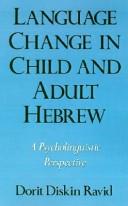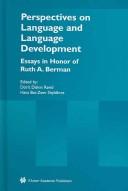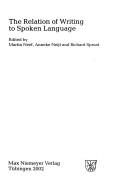| Listing 1 - 10 of 13 | << page >> |
Sort by
|
Book
ISBN: 1441905871 1299196993 144190588X Year: 2012 Publisher: New York : Springer,
Abstract | Keywords | Export | Availability | Bookmark
 Loading...
Loading...Choose an application
- Reference Manager
- EndNote
- RefWorks (Direct export to RefWorks)
Modern Hebrew is a highly synthetic Semitic language—its lexicon is rich in morphemes. This volume supplies the first in-depth psycholinguistic analysis of the interaction between morphological knowledge and spelling in Hebrew. It also examines how far this model can be applied to other languages. Anchored to a connectionist, cognitive, cross-linguistic and typological framework, the study accords with today’s perception of spelling as being much more than a mere technical skill. Contemporary psycholinguistic literature views spelling as a window on what people know about words and their structure. The strong correlation between orthographies and morphological units makes linking consistent grammatical and lexical representation and spelling units in speaker-writers a key research goal. Hebrew’s wealth of morphological structures, reflected in its written form, promotes morphological perception and strategies in those who speak and write it, adding vitality and relevance to this work.
Hebrew language -- Grammar. --- Hebrew language. --- Hebrew language --- Spelling, Psychology of --- Education --- Languages & Literatures --- Social Sciences --- Middle Eastern Languages & Literatures --- Education, Special Topics --- Morphology --- Orthography and spelling --- Psycholinguistics. --- Orthography and spelling. --- Language, Psychology of --- Language and languages --- Psychology of language --- Speech --- Psychological aspects --- Psychology --- Education. --- Applied linguistics. --- Comparative linguistics. --- Semitic languages. --- Language and education. --- Language Education. --- Semitic Languages. --- Comparative Linguistics. --- Applied Linguistics. --- Linguistics --- Thought and thinking --- Language and languages. --- Foreign languages --- Languages --- Anthropology --- Communication --- Ethnology --- Information theory --- Meaning (Psychology) --- Philology --- Comparative philology --- Philology, Comparative --- Historical linguistics --- Afroasiatic languages --- Educational linguistics --- Oriental languages. --- Oriental or Semitic Languages. --- Psycholinguistics and Cognitive Lingusitics. --- Study and teaching. --- Language and languages Study and teaching --- Study and teaching --- Language and education --- Language schools --- Languages, Oriental

ISBN: 0195358139 1280527501 1429406569 9781429406567 9781280527500 9780195088939 019508893X 9786610527502 6610527504 0195090365 019508893X 9780195090369 0197721877 Year: 1995 Publisher: New York, N.Y. Oxford University Press
Abstract | Keywords | Export | Availability | Bookmark
 Loading...
Loading...Choose an application
- Reference Manager
- EndNote
- RefWorks (Direct export to RefWorks)
Tracing the language development in Hebrew-speakers from childhood to adulthood, this study focuses on inflectional morphology (the grammatical form of words). It explores strategies of language acquisition in speakers of different ages and socioeconomic backgrounds.
Hebrew language --- Jewish language --- Jews --- Semitic languages, Northwest --- Acquisition. --- Variation. --- Inflection. --- Languages --- Acquisition --- Inflection --- Variation --- Psycholinguistics
Digital
ISBN: 9781441905888 Year: 2012 Publisher: Boston, MA Springer US
Abstract | Keywords | Export | Availability | Bookmark
 Loading...
Loading...Choose an application
- Reference Manager
- EndNote
- RefWorks (Direct export to RefWorks)
Didactics of languages --- Comparative linguistics --- Psycholinguistics --- Linguistics --- Semitic languages --- talenonderwijs --- linguïstiek --- psycholinguïstiek
Book
ISBN: 9781441905888 Year: 2012 Publisher: Boston, MA Springer US
Abstract | Keywords | Export | Availability | Bookmark
 Loading...
Loading...Choose an application
- Reference Manager
- EndNote
- RefWorks (Direct export to RefWorks)
Modern Hebrew is a highly synthetic Semitic language its lexicon is rich in morphemes. This volume supplies the first in-depth psycholinguistic analysis of the interaction between morphological knowledge and spelling in Hebrew. It also examines how far this model can be applied to other languages. Anchored to a connectionist, cognitive, cross-linguistic and typological framework, the study accords with today's perception of spelling as being much more than a mere technical skill. Contemporary psycholinguistic literature views spelling as a window on what people know about words and their structure. The strong correlation between orthographies and morphological units makes linking consistent grammatical and lexical representation and spelling units in speaker-writers a key research goal. Hebrew's wealth of morphological structures, reflected in its written form, promotes morphological perception and strategies in those who speak and write it, adding vitality and relevance to this work.
Didactics of languages --- Comparative linguistics --- Psycholinguistics --- Linguistics --- Semitic languages --- talenonderwijs --- linguïstiek --- psycholinguïstiek
Multi
ISBN: 9781402079115 Year: 2005 Publisher: Boston, MA Kluwer Academic Publishers
Abstract | Keywords | Export | Availability | Bookmark
 Loading...
Loading...Choose an application
- Reference Manager
- EndNote
- RefWorks (Direct export to RefWorks)
Sociolinguistics --- Psycholinguistics --- Linguistics --- linguïstiek --- psycholinguïstiek --- sociolinguïstiek

ISBN: 1280611863 9786610611867 1402079117 1402079036 144195449X Year: 2005 Publisher: Dordrecht ; Boston : Kluwer Academic,
Abstract | Keywords | Export | Availability | Bookmark
 Loading...
Loading...Choose an application
- Reference Manager
- EndNote
- RefWorks (Direct export to RefWorks)
Perspectives on Language and Language Development brings together new perspectives on language, discourse and language development in 31 chapters by leading scholars from several countries with diverging backgrounds and disciplines. It is a comprehensive overview of language as a rich, multifaceted system, inspired by the lifework of Ruth A. Berman. Edited by Dorit Ravid and Hava Bat-Zeev Shyldkrot, both from Tel Aviv University, Israel, the book offers state-of-the-art portrayals of linguistic and psycholinguistic phenomena with new insights on the interrelations of language structure, discourse theory, and the development of language and literacy. The volume presents innovative investigations on the interface of language and narrative in a broad range of languages, with a section devoted to linguistic studies of Modern Hebrew. It traces the development of language and literacy from early childhood through adolescence to maturity in spoken and written contexts, and in monolingual as well as multilingual perspectives. Linguists, psycholinguists, discourse scholars, cognitive psychologists, language teachers, education experts, and clinicians working in the field of language and discourse will find this book extremely useful both as a textbook and as a source of information.
Linguistics. --- Language acquisition. --- Linguistic science --- Science of language --- Language and languages --- Acquisition of language --- Developmental linguistics --- Developmental psycholinguistics --- Language development in children --- Psycholinguistics, Developmental --- Interpersonal communication in children --- Psycholinguistics --- Acquisition --- Psycholinguistics. --- Sociolinguistics. --- Linguistics, general. --- Language and society --- Society and language --- Sociology of language --- Language and culture --- Linguistics --- Sociology --- Integrational linguistics (Oxford school) --- Language, Psychology of --- Psychology of language --- Speech --- Psychology --- Thought and thinking --- Social aspects --- Sociological aspects --- Psychological aspects
Book
ISBN: 9781402079115 Year: 2005 Publisher: Boston MA Springer US
Abstract | Keywords | Export | Availability | Bookmark
 Loading...
Loading...Choose an application
- Reference Manager
- EndNote
- RefWorks (Direct export to RefWorks)
Perspectives on Language and Language Development brings together new perspectives on language, discourse and language development in 31 chapters by leading scholars from several countries with diverging backgrounds and disciplines. It is a comprehensive overview of language as a rich, multifaceted system, inspired by the lifework of Ruth A. Berman. Edited by Dorit Ravid and Hava Bat-Zeev Shyldkrot, both from Tel Aviv University, Israel, the book offers state-of-the-art portrayals of linguistic and psycholinguistic phenomena with new insights on the interrelations of language structure, discourse theory, and the development of language and literacy. The volume presents innovative investigations on the interface of language and narrative in a broad range of languages, with a section devoted to linguistic studies of Modern Hebrew. It traces the development of language and literacy from early childhood through adolescence to maturity in spoken and written contexts, and in monolingual as well as multilingual perspectives. Linguists, psycholinguists, discourse scholars, cognitive psychologists, language teachers, education experts, and clinicians working in the field of language and discourse will find this book extremely useful both as a textbook and as a source of information.
Sociolinguistics --- Psycholinguistics --- Linguistics --- linguïstiek --- psycholinguïstiek --- sociolinguïstiek


ISBN: 348430460X 3110918609 9783110918601 9783484304604 Year: 2012 Publisher: Tübingen
Abstract | Keywords | Export | Availability | Bookmark
 Loading...
Loading...Choose an application
- Reference Manager
- EndNote
- RefWorks (Direct export to RefWorks)
This volume grew out of the workshop Writing Language, held at the Max Planck Institute, Nijmegen. The papers represent several lines of research into the intricate relation between writing and spoken language: Theoretical and computational linguists discuss the models that explain why orthographies are the way they are and the constraints that hold between writing and speaking a language; researchers in special education deal with the question of how certain aspects of orthography can be learned; and psycholinguists discuss aspects of language processing affected by variation in orthographies.
Written communication. --- Oral communication. --- Oral transmission --- Speech communication --- Verbal communication --- Communication --- Written discourse --- Written language --- Discourse analysis --- Language and languages --- Visual communication --- Written communication --- Oral communication
Book

ISBN: 9783110339529 Year: 2013 Publisher: Berlin Boston
Abstract | Keywords | Export | Availability | Bookmark
 Loading...
Loading...Choose an application
- Reference Manager
- EndNote
- RefWorks (Direct export to RefWorks)
Book

ISBN: 1282194682 9786612194689 3110199122 9783110199123 9783110196191 3110196190 Year: 2008 Publisher: Berlin Boston
Abstract | Keywords | Export | Availability | Bookmark
 Loading...
Loading...Choose an application
- Reference Manager
- EndNote
- RefWorks (Direct export to RefWorks)
The volume explores key convergences between cognitive and discourse approaches to language and language learning, both first and second. The emphasis is on the role of language as it is used in everyday interaction and as it reflects everyday cognition. The contributors share a usage-based perspective on language - whether they are examining grammar or metaphor or interactional dynamics - which situates language as part of a broader range of systems which underlie the organization of social life and human thought. While sharing fundamental assumptions about language, the particulars of the areas of inquiry and emphases of those engaged in discourse analysis versus cognitive linguistics are diverse enough that, historically, many have tended to remain unaware of the interrelations among these approaches. Thus, researchers have also largely overlooked the possibilities of how work from each perspective can challenge, inform, and enrich the other. The papers in the volume make a unique contribution by more consciously searching for connections between the two broad approaches. The results are a set of dynamic, thought-provoking analyses that add considerably to our understanding of language and language learning. The papers represent a rich range of frameworks within a usage-based approach to language. Cognitive Grammar, Mental Space and Blending Theory, Construction Grammar, ethnomethodology, and interactional sociolinguistics are just some of the frameworks used by the researchers in this volume. The particular subjects of inquiry are also quite varied and include first and second language learning, signed language, syntactic phenomena, interactional regulation and dynamics, discourse markers, metaphor theory, polysemy, language processing and humor. The volume is of interests to researchers in cognitive linguistics, discourse and conversational analysis, and first and second language learning, as well as signed languages.
Discourse analysis. --- Cognitive grammar. --- Language acquisition. --- Acquisition of language --- Developmental linguistics --- Developmental psycholinguistics --- Language and languages --- Language development in children --- Psycholinguistics, Developmental --- Interpersonal communication in children --- Psycholinguistics --- Cognitive linguistics --- Grammar, Comparative and general --- Discourse grammar --- Text grammar --- Semantics --- Semiotics --- Acquisition --- Cognitive linguistics. --- discourse analysis.
| Listing 1 - 10 of 13 | << page >> |
Sort by
|

 Search
Search Feedback
Feedback About UniCat
About UniCat  Help
Help News
News